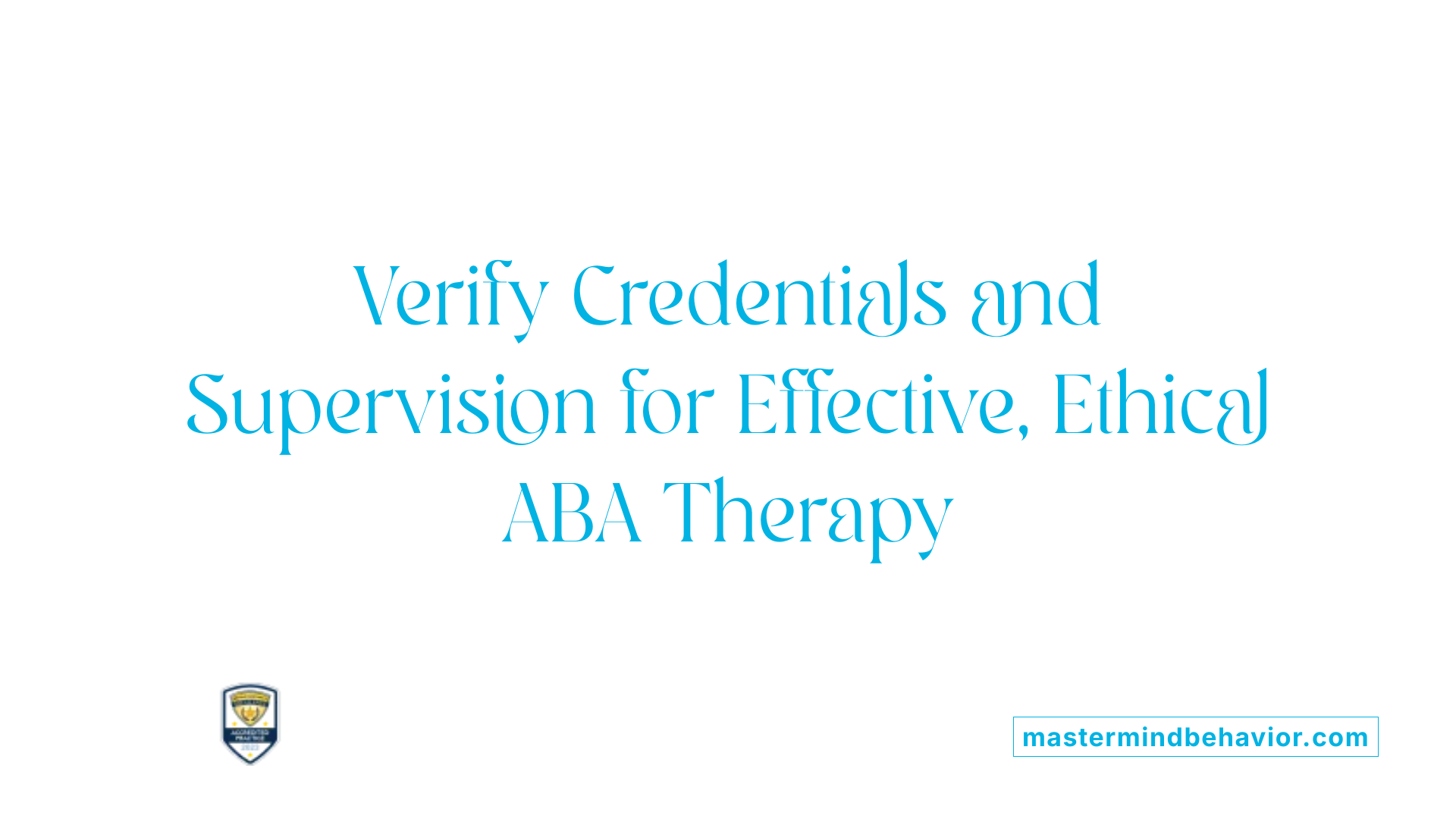Understanding What Matters in ABA Therapy Selection
Choosing the best ABA therapy provider is a critical step in supporting your child's development, especially if they are on the autism spectrum. Effective ABA (Applied Behavior Analysis) can be transformative, helping children develop essential skills, reduce problematic behaviors, and improve their quality of life. However, selecting the right provider involves careful consideration of multiple factors—from credentials and treatment approaches to family involvement and ethical standards. This article guides you through the essential elements to evaluate to ensure you partner with a provider committed to your child's unique needs.
Essential Qualifications and Credentials of ABA Providers

What qualifications should I look for in an ABA therapist or provider?
When selecting an ABA therapy provider, it’s crucial to check the credentials of the staff. The most qualified professionals are Board Certified Behavior Analysts (BCBAs), who must hold a master’s or doctoral degree in psychology, education, or behavior analysis. They are certified by the Behavior Analyst Certification Board (BACB) and should have passed a rigorous certification exam.
A reputable provider ensures that all therapists working directly with children are supervised by BCBAs. This supervision can be direct or remote, but it must be consistent and ongoing. The program should involve thorough background checks for all staff, emphasizing the safety and well-being of the child.
It’s also important to verify their data collection methods for monitoring progress and their ability to tailor interventions to your child's specific needs. The focus should always be on positive reinforcement and socially meaningful behaviors. Transparency about their credentials, supervision approach, and program goals helps you choose a trustworthy provider. Moreover, active parent involvement in the therapy plan and regular updates are signs of a genuine, person-centered approach.
How can I verify the qualifications of an ABA provider?
To ensure a provider’s credibility, start by confirming that they employ BCBAs with valid certification from the BACB. These professionals should also have relevant state licensure, where applicable, and demonstrate a commitment to ongoing professional development.
Ask for details about their staff’s training and supervision practices. Good providers will provide evidence of their therapists' qualifications and adherence to ethical standards laid out by the BACB. It’s also helpful to check reviews or get recommendations from other families who have used the services.
Assess whether the provider’s approach aligns with current research and best practices. Open communication about their team’s credentials and ongoing education ensures that your child receives high-quality, ethically sound care.
| Qualification/Aspect | What to Check | Why It Matters |
|---|---|---|
| BCBA Certification | Certification from BACB | Ensures tested, standardized professional standards |
| Educational Background | Master's or PhD in relevant fields | Indicates advanced knowledge and training |
| State Licensure | State-specific license if required | Confirms legal compliance and professional standing |
| Supervision & Training | Regular oversight by BCBAs | Promotes consistent, effective treatment |
| Ethical Standards | Adherence to BACB guidelines | Ensures safe, respectful treatment |
| Ongoing Education | Continuing education credits | Keeps skills current and evidence-based |
Selecting a provider with qualified, well-trained staff supervised by credentialed BCBAs allows for effective, ethical, and individualized ABA therapy, promoting better outcomes for your child.
Developing Individualized and Evidence-Based Treatment Plans

How do I make an informed decision about selecting an ABA therapy provider?
Choosing the right ABA provider begins with verifying their credentials. Ensure that they employ qualified professionals, particularly Board Certified Behavior Analysts (BCBAs), who have advanced degrees in psychology or behavior analysis. Ask about their commitment to evidence-based practices supported by scientific research.
Inquire whether they conduct comprehensive initial assessments, including functional behavior analyses, to tailor treatment plans to your child's specific needs. It's also important to understand how they monitor progress through standardized data collection methods such as frequency counts, skill assessments, and ongoing evaluations.
Family involvement, cultural sensitivity, ethical standards, and transparency in costs and services should influence your decision. Compatibility with your child's needs and your family’s routines, along with positive reviews or recommendations, can further guide you to a provider that offers respectful, effective, and personalized care.
What key elements should a personalized ABA plan include?
A personalized ABA plan starts with a thorough initial assessment, often a functional behavior assessment (FBA), to pinpoint your child's unique strengths and challenges. The plan sets specific, measurable goals aligned with your child's age and developmental stage, including communication skills, social interaction, and adaptive behaviors.
Strategies within the plan should be evidence-based, emphasizing positive reinforcement and naturalistic teaching to promote skill generalization across settings. Ongoing progress measurement is crucial, utilizing data collection tools like charts or standardized assessments to monitor whether the goals are being met.
Family involvement is essential, meaning parents are trained to implement strategies at home, ensuring consistency and sustainability. The plan must also respect ethical guidelines, be culturally sensitive, and create a safe, engaging environment that prioritizes your child's preferences.
Why is data collection vital in ABA therapy?
Data collection provides an objective way to track your child's progress. It offers measurable evidence that helps determine whether the interventions are effective or need adjustment. By recording behaviors, skill acquisition, and instances of generalization, therapists can make informed decisions rather than relying solely on subjective impressions.
Methods such as charts, frequency counts, task analyses, and standardized assessments are used for systematic data collection. Regular analysis of this data reveals trends over time, which guides modifications to treatment strategies, goals, or intensity.
Sharing these insights with families fosters transparency, accountability, and a collaborative approach, ensuring therapy remains aligned with your child's evolving needs.
How often should progress be evaluated and how are goals adjusted?
Progress should be reviewed regularly—ideally at each session and during scheduled formal assessments. The supervising BCBA and therapy team analyze data to gauge whether your child's goals are being met.
If progress stalls or goals are not achieved, strategies should be revised, new objectives set, or approaches modified. This ongoing evaluation ensures that therapy adapts to your child's development, promoting continuous growth.
Open communication with the therapy team and family about progress and adjustments fosters trust and enables collaborative decision-making, making sure the treatment remains relevant and effective.
What is an ideal therapy approach for my child’s needs?
An effective therapy approach is highly individualized, combining thorough assessment and tailored strategies. It incorporates your child's interests and motivations, making learning engaging and natural.
The focus should be on socially significant skills, such as effective communication, social interaction, and daily living. Positive reinforcement, ethical practices, and consistency across settings—home, school, and community—are essential.
The best approach involves ongoing assessments, flexible adjustments, and active family participation. This ensures that therapy remains supportive, culturally sensitive, and aligned with your child's unique personality and developmental trajectory.
| Aspect | Details | Additional Notes |
|---|---|---|
| Initial Assessment | Conduct comprehensive functional behavior analysis | Form the foundation for tailored goals |
| Goals | Set measurable, personalized objectives | Focus on meaningful, socially relevant skills |
| Data Collection | Use charts, standardized tools | Monitor progress objectively and guide adjustments |
| Family Role | Training, feedback, collaboration | Ensures consistency and sustainability |
| Ethical Practice | Positive reinforcement, cultural sensitivity | Prioritize safety, dignity, and respect |
Adopting an evidence-based, individualized approach maximizes your child's potential and enhances quality of life. Regular assessment, family involvement, and data-driven adjustments are integral to successful ABA therapy.
The Role of the BCBA and Supervision in Ensuring Quality Care
What qualifications and supervisory practices ensure quality ABA therapy?
When choosing an ABA provider, it is essential to confirm that supervision is conducted by qualified Board Certified Behavior Analysts (BCBAs). These professionals typically hold a master's or doctoral degree in psychology, behavior analysis, or education. Their responsibilities include creating personalized treatment plans, supervising staff training, and ensuring therapy complies with ethical standards set by the Behavior Analyst Certification Board (BACB).
Regular supervision, whether onsite or via telehealth, helps maintain high standards of practice. Effective providers offer ongoing professional development for their staff and supervise Registered Behavior Technicians (RBTs) or other frontline practitioners to uphold fidelity to evidence-based methodologies. Such consistent oversight ensures therapy is safe, effective, and continuously improving—key factors in your child's success.
Why is BCBA supervision critical for effective ABA therapy?
BCBAs bring specialized training and an ethical duty to oversee ABA interventions. Their supervision guarantees that strategies are tailored to the child's needs, ethically appropriate, and grounded in scientific research. BCBAs monitor therapy fidelity, supervise behavior technicians, analyze data, and refine interventions as needed. They also provide staff training and ensure safety protocols are in place.
Having a BCBA involved—whether directly or through remote oversight—creates accountability and expertise that benefits your child's treatment. Their ongoing assessment helps identify improvements or adjustments necessary for maximizing progress. This layered supervision enhances the safety, effectiveness, and ethical integrity of ABA therapy, making it a crucial element in achieving positive outcomes.
Family Involvement and Collaboration in ABA Services
Why is parent involvement important in ABA therapy, and how can I participate effectively?
Parent participation plays a vital role in the success of ABA therapy. When parents actively engage, they reinforce learned skills, promote consistency in different environments, and ensure that behaviors are generalized beyond the therapy setting. This involvement helps foster meaningful progress and strengthens the emotional connection between parent and child.
To be effective partners, parents should attend training sessions offered by their child's therapist. Observing sessions when possible provides insights into the strategies used and how to implement them at home. Incorporating ABA techniques into daily routines, such as mealtimes and play, helps children practice skills in real-world settings.
Consistent positive reinforcement by parents accelerates learning and boosts motivation. Overcoming logistical barriers like scheduling conflicts and staying updated on the child's evolving needs ensure ongoing support. Engaged parents look for opportunities to practice strategies, communicate regularly with therapists, and provide encouragement, creating a cohesive and supportive environment for their child's growth.
Addressing Ethical Standards, Safety, and Red Flags
Use of punishment versus positive reinforcement
Effective ABA therapy relies on positive techniques such as reinforcement and skill-building rather than punishment. Ethical providers prioritize encouraging good behaviors through praise, rewards, and engaging activities. Punitive methods, like yelling, physical punishment, or harsh correction, are red flags and should be avoided, as they can harm the child's emotional well-being and hinder progress.
Signs of unprofessional practices
Recognizing unprofessional practices is crucial for ensuring your child's safety. Warning signs include inconsistent therapy sessions, high staff turnover, and lack of transparency about credentials or treatment strategies. Providers that dismiss parental input, avoid functional assessments, or refuse to share data on your child’s progress are concerning.
Poor communication, inappropriate behavior by therapists—such as raising their voice or using force—and a one-size-fits-all approach also signal subpar service. A reputable provider will have clear, ethical procedures, maintain transparency, and involve parents actively.
Ensuring culturally sensitive care
High-quality ABA providers respect cultural differences and tailor their approach accordingly. Learning and communicating in the family's preferred language, understanding cultural values, and adapting interventions to fit the family's context are vital for meaningful therapy.
Red flags in ABA therapy providers include:
| Warning Signs | Why It Matters | What to Do |
|---|---|---|
| Lack of transparency about credentials | Can indicate unqualified providers | Ask for documentation, verify certifications |
| Use of punitive methods | Can cause harm and violate ethics | Observe for positive reinforcement practices |
| Inconsistent sessions or staff turnover | Disrupts learning and progress | Check staffing stability and continuity |
| Resistance to parental participation | Hinders personalized care | Ensure providers include family in planning |
| Signs of unprofessional behavior | Impact safety and trust | Trust your instincts and seek reputable providers |
What red flags or warning signs should I watch out for in ABA therapy providers?
Red flags include unclear credentials, reliance on punishment, poor communication, and unprofessional conduct. If you notice aggressive interactions, neglect of the child’s dignity, or generic treatment models that don’t address your child's specific needs, consider seeking alternative providers. An ethical provider will be transparent, supportive, and committed to positive, individualized care.
Why is adherence to ethical standards critical in ABA?
Adherence to ethical standards safeguards your child's safety and promotes trust between families and providers. Ethical ABA emphasizes positive reinforcement, respects the child's dignity, and involves parents as partners. It prevents harm caused by punitive tactics or neglect and ensures interventions are rooted in current research and professional guidelines.
What should I do if I suspect unethical practices?
If you suspect your provider is engaging in unethical behaviors, document your concerns with specifics and discuss them directly with the supervisor or agency. You can also reach out to licensing boards or certification organizations for guidance. If necessary, consider switching providers to protect your child's best interests. Remember, your child's safety and well-being come first, and ethical providers will support your questions and concerns.
Setting Up for Long-Term Success and Transition Planning

How can I assess if an ABA provider considers long-term outcomes?
A high-quality ABA provider should focus not only on immediate behavior change but also on fostering ongoing development and independence. During your evaluation, ask about their criteria for transitioning or discharging your child. Ideally, these criteria should include the achievement of age-appropriate skills and evidence that your child is ready to progress to the next stage of development.
Good providers also discuss how they support skill maintenance and generalization beyond active therapy sessions. This can involve follow-up assessments, booster sessions, or strategies for reinforcing learned skills at home and in community settings.
Long-term planning is embedded from the start, with providers emphasizing sustainable growth. They often collaborate with educational, community, and healthcare resources to ensure continuity of support, helping your child thrive beyond formal therapy.
What are signs of a provider that prioritizes sustainable, lifelong benefits?
Providers prioritizing lifelong benefits will integrate long-term goals into every phase of treatment. They will clearly define criteria for when your child can graduate from intensive intervention, focusing on skills that generalize across environments and activities.
Expect them to prepare families with strategies that foster independence at home, in school, and within the community. These providers maintain open communication about future planning, ongoing assessments, and booster sessions.
Such programs emphasize skills that promote autonomy, resilience, and social integration. They actively collaborate with schools, community programs, and other professionals, ensuring your child’s successful transition into different life stages, including adulthood.
How important is staff continuity and ongoing support after therapy ends?
Consistent staff relationships are vital because they help ensure that interventions remain effective over time. Continuity with trained professionals, especially the supervising BCBA, provides stability and sustained support.
Effective providers plan for ongoing assistance post-therapy, which might include booster sessions, transition support, or referrals to other services. This ongoing care helps prevent regressions and maintains progress.
Staff turnover or lack of follow-up can adversely impact your child's skills, leading to setbacks. A dedicated provider prioritizes long-term outcomes by establishing a clear plan for continued guidance, ensuring that your child’s development continues smoothly even after formal therapy concludes.
In selecting an ABA provider, inquire about their procedures for long-term support and how they intend to help your child maintain and build on achieved skills over the years.
Empowering Parents for Better Outcomes
Selecting the right ABA therapy provider is an investment in your child's future. By focusing on qualified professionals, individualized, evidence-based plans, ethical practices, active family involvement, and long-term support, you can find a partner dedicated to your child's growth and well-being. Remember, an open dialogue, thorough research, and alignment of values are key to ensuring your child receives ethical, effective, and compassionate care that fosters meaningful progress and lifelong skills.
References
- A Guide to Selecting an ABA Provider for Your Child
- How to Choose the Right ABA Therapy Provider for Your Family
- Questions to ask an ABA therapist | Autism Speaks
- 15 Things to Consider When Choosing the Right ABA Provider
- Essential Questions to Ask When Choosing the Best ABA Therapy
- 5-Point Checklist for Choosing the Right ABA Therapy Provider
- What to Look For When Choosing an ABA Therapist
- How to Choose the Best ABA Therapy Provider for Your Child
- How to Choose the Best ABA Provider for Your Child
- The Ultimate Guide to Selecting the Right ABA Therapy Provider for ...








